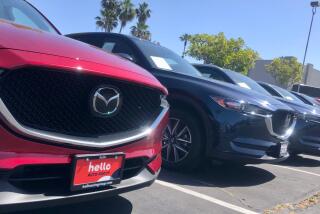Opinion: It’s GM today, but why do automakers keep building cars that kill us?

- Share via
Would you buy a car from General Motors?
There was a time when the majority of Americans would’ve answered, unhesitatingly and resoundingly, yes.
Today? Probably not so much.
PHOTOS: From the Fed to GM, 5 top-tier women trying to fix man-made messes
Weeks of news stories — and two days of hearings on Capitol Hill spent grilling the company’s chief executive officer, Mary Barra — about faulty ignition switches that led to at least 13 fatal accidents will do that to an automaker’s reputation.
What we know is that some GM cars had ignition switches that failed under certain circumstances, which in turn led to accidents. Not only that, GM knew of the problem but either a) inexplicably failed to act quickly to fix it and alert consumers or b) actually covered up the problem, presumably to save money.
So GM and its new CEO are on the hot seat. Some in Congress are accusing the company of criminal conduct. Lawyers for victims are lining up to sue. Its recent bankruptcy must seem like a walk in the park compared to the current firestorm.
But the deeper question is, is GM’s behavior actually so unusual, at least in the auto industry?
History says no. Start with GM’s Corvair, made infamous by Ralph Nader in his 1965 book, “Unsafe at Any Speed.” Fast forward a bit to the 1970s and Ford’s Pinto, the little car with the exploding gas tank. Fast forward still more years and you get to Toyota, which this month paid a $1.2-billion fine related to fatal accidents blamed on sudden acceleration in some of its vehicles.
And those are just the most headline-grabbing incidents. Just try to find an automaker that hasn’t had quality issues with some of its models. Some have fatal consequences; some are just fatal to consumers’ pocketbooks.
Now, the auto industry is heavily regulated, both in terms of safety and pollution from its vehicles.
So why, and how, do companies keep producing cars that kill us? And especially, why and how do they keep producing cars that kills us even when workers and executives are aware of a potentially fatal defect?
Where, oh where, are the regulators?
Two days of hearings have produced a lot of harrumphing and pontificating by members of Congress. As if that will keep us safe. As if that will solve the problem.
But it won’t. Bashing GM for its shortcomings makes headlines. It makes it seem as though our politicians care.
But if they really care, they’ll figure out why the government regulations and oversight we have in place haven’t worked, aren’t working. Those regulators are going to get their turn in the hot seat now. Let’s hope they have some answers.
GM messed up. But so did Toyota. So did Ford.
And just calling hearings to bash car company CEOs every time an automaker messes up won’t cut it.
ALSO:
Paul Ryan the anti-Robin Hood: Robbing the poor to help the rich
Beware of Oculus Rift: If you think Facebook is bad now, just waitSo Mozilla employees don’t like the new boss’ politics? Live with it.
Follow Paul Whitefield on Twitter @PaulWhitefield1 and Google +
More to Read
A cure for the common opinion
Get thought-provoking perspectives with our weekly newsletter.
You may occasionally receive promotional content from the Los Angeles Times.











